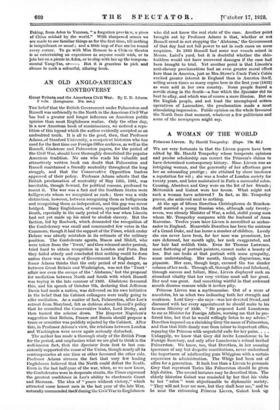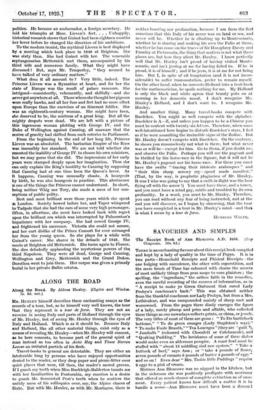A WOMAN OF THE WORLD
Princess Lieven. By Harold Temperley. (Cape. 12s. 6d.)
WE are very fortunate in that the Lieven papers have been edited by Mr. Harold Temperley whose temperate opinions
and precise scholarship can correct the Princess's claims to
have determined contemporary history. Mme. Lieven was an intriguing woman, and the generosity of her affections gave
her an astounding prestige ; she attained by sheer insolence a reputation for wit ; she was a leader of London society for twenty years, and later maintained in Paris a successful salon.
Canning, Aberdeen and Grey were on the list of her friends ; Metternich and Guizot were her lovers. What might not such a woman have achieved ? In fact, as Mr. Temperley proves, she achieved next to nothing.
At the age of fifteen Dorothea Christopherna de Beneken- dorff married a young Russian who, although only twenty-
seven, was already Minister of War, a solid, stolid young man whom Mr. Temperley compares with the husband of Anna Karenine. Twelve years later Lieven is accredited as ambas- sador to England. Meanwhile Dorothea has been the mistress of a Grand Duke, and has borne a number of children. Lovely she can never have been, for her nose was prominent, her
ears deformed, her mouth ugly, her neck exaggerated, and her hair had reddish tints. Even Sir Thomas Lawrence, most flattering of portrait painters, cannot make a beauty of her. But one looks at that portrait with some sympathy, some understanding. Her mouth, though disgracieuse, was piquante. Her ears, though large, excused the too slender
column of her neck. Through all, through follies and falsehood, through success and failure, Mme. Lieven displayed such an abundant vitality that her very victims must call her great. Her soul was great. And something wistful in that awkward mouth disarms censure while it invites pity.
Princess Lieven was a mythomaniac. Out of a score of anecdotes, let us select two indicating both her strength and
.weakness. Lord Grey—she says—was her devoted friend, and discussed with her every appointment he should make to his famous Ministry of 1830. " He proposed Lord Lansdowne to me as Minister for Foreign Affairs, warning me that he pre- ferred him, but that he would willingly listen to my advice." Dorothea imposed on a shrinking Grey the name of Palmerston, and thus that little dandy rose from minor to important office,
repaying the Princess with ungrateful exile for her pains. . . . Unhappily, we know that Grey did invite Lansdowne to be
Foreign Secretary, and only after Lansdowne's refusal invited Palmerston. We know, too, that Dorothea, in her amazing ignorance of any but despotic constitutions, never understood the importance of adulterating pure Whiggism with a certain experience in administration. The Whigs had been out of office for a generation. It took less than a Lieven to persuade Grey that repentant Tories like Palmerston should be given high duties. The second instance may be described thus. The elderly historian Guizot was reminded by her that his visits to her " salon " were objectionable to diplomatic society. " They will not hear me now, but they shall hear me," and to be near the entrancing Princess Lieven, Guizot took up politics. He became an ambassador, a foreign secretary. He laid his triumphs at Mme. Lieven's feet. . . . Unhappily, historical research shows that Guizot had been eighteen months her lover before he changed the direction of his ambitions.
To the modern ironist, the mythical Lieven is best displayed by a meeting which took place in 1848 at Brighton. She was sixty then. She had Guizot with her. The venerable septuagenarian Metternich met them, accompanied by his third wife and numerous family. What they might have discussed I But, says Mr. Temperley, " they seemed to have talked of very ordinary matters."
What does it all amount to ? Very little, indeed. The Princess Lieven was a Byzantine at heart, and for her the state of Europe was the result of palace rancours. She Intrigued—consistently, vehemently, and skilfully—and she never got anywhere at all. Those whom she thought her pigeons were really hawks, and all her fuss and fret had no more effect upon Europe than the exercises of an itinerant fiddler. She was an eighteenth-century woman. She might have been, she deserved to be, the mistress of a great king. But all the mighty despots were dead. We are left with a picture of this ingenuous woman plotting with George IV. and the Duke of Wellington against Canning, all unaware that the centre of gravity had shifted from such coteries to Parliament.
From the beginning to the end of her long life, Princess Lieven was an absolutist. The barbarian Empire of the Russ was insensibly her standard. We are not told whether she resented the inability of George IV. to choose his own ministers, but we may guess that she did. The impressions of her early years were stamped deeply upon her imagination. Thus she can only explain the King's hostility to Canning by supposing that Canning had at one time been the Queen's lover. As It happens, Canning was unusually chaste. A bourgeois by birth, he was also bourgeois in practice. This abstinence is one of the things the Princess cannot understand. In short, being neither Whig nor Tory, she made a mess of her con- ceptions of public polity.
Best and most brilliant were those years which she spent hi London. Society bowed before her, and Taper whispered to Tadpole that she had the ears of some very high personages. Often, in aftertime, she must have looked back with regret upon the brilliant era which was interrupted by Palmerston's Impatience with her company. She had cowed George W. and frightened his successor. Victoria she could not amuse, and her curt dislike of the Prince Consort for ever estranged her from the young queen. So she plays for a while with Guizot's career. She shares in the debacle of 1848. She meets at Brighton old Metternich. She turns again to Flunce. She dies deludedly applauding the mysterious powers of the third Napoleon. They were all dead, George and Canning, Wellington and Grey, Metternich and the Grand Dukes. Dorothea went to join them. Her corpse was given a princely burial in her private Baltic estates.



















































 Previous page
Previous page